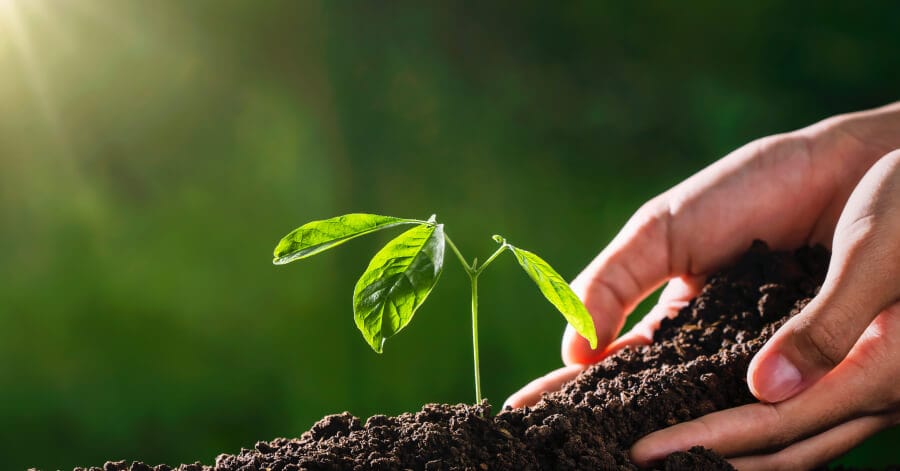Hyundai Motorstudio Senayan Park
Hyundai Motorstudio Senayan Park
Newsroom
The official news from Hyundai Motorstudio Senayan Park and a collection of innovative articles on mobility and sustainability here.
-
Understanding Compost and Its Benefits for Soil Fertility
- Hyundai Motorstudio Senayan Park Senayan Park 2022.09.19
-
Do you know that using composted soil can save water more in your garden? Recently, most people know the meaning of compost as soil fertilizer. However, it turns out that compost also helps maximize water absorption, so crop irrigation can run efficiently.
Compost can be used for large farms or home gardens. Want to know what compost means and its benefits for soil fertility? Read more below!
What is Compost?
In a simple sense, the meaning of compost is the remains of organic materials such as food scraps, leaves, and livestock manure, which are decomposed by microorganisms in the soil.
Components in compost can fertilize the soil because it contains macro minerals and nutrients that are able to balance soil pH levels. Thus, plants become more fertile and grow faster.
Benefits of Compost for Soil Fertility
In fact, understanding the meaning of compost as fertilizing and balancing soil pH is very important. Because, over time, agricultural land can experience a decline in productivity.
One of the easiest ways to improve soil fertility is to add compost or composted soil.
Here are some of the benefits of compost for soil fertility
1. Compost Nourishing Soil
When the decomposition process is successful, the compost will nourish the soil and enrich the soil. There are three main nutrients that plants need, namely nitrogen, phosphorus, and potassium.
Compost not only nourishes plants, but the ingredients for making it are easily obtained from organic waste. Compost also increases the number of good microorganisms in the soil, thereby accelerating plant growth.
2. Compost Increases Soil Moisture
Various studies have shown that compost can reduce the formation of soil crust. This means that the soil becomes more friable and facilitates the process of water absorption.
Water can seep and spread laterally from where it originally touched the ground. In turn, it can speed up evaporation and help water get to plant roots more effectively.
3. Prevent Soil Erosion
Have you ever seen a sloping farm field on the bank of a river, but still safe from landslides when it rains? In the city of Illinois, farmers add composted soil to their fields to reduce soil erosion.
In addition, the flow of rivers and other waterways, remains clear to protect river ecosystems, such as fish and other aquatic invertebrates. This is because the soil that is added with compost is stronger at holding water.
4. Accelerate Plant Growth
If the health conditions of the soil and water are maintained with compost, the plants will also thrive. Plants with composted manure produced significantly more biomass. In fact, plants can thrive about 50% more or twice as much as without compost soil.
5. Reducing Waste and Carbon Emissions
Of course, sustainable agriculture with compost will be very beneficial for the environment and soil fertility. However, there are greater environmental benefits, namely reducing waste and carbon emissions.
Kitchen waste or food scraps, can be processed into compost. The more waste that is converted into compost, the more carbon emissions are released into the atmosphere.
6. Composting Reduces Methane Emissions in Final Disposal
When organic matter decomposes in an oxygen-poor environment, anaerobic decay occurs. What are the consequences? There will be an unpleasant odor and release methane gas into the atmosphere. Worse yet, methane gas is 34% more dangerous than carbon dioxide. Methane gas can cause respiratory disease if it is inhaled frequently by humans.
A way to reduce the amount of methane produced in landfills is to turn organic waste into compost.
7. Utilizing Agricultural Waste
When the planting or harvesting process takes place, there is often leftover agricultural waste that is not needed. For example, plant twigs, straw residue, leaf residue, and others.
Based on research in India, about 50% of agricultural waste is used by residents as roofing material, animal feed, firewood, or packaging material for wooden boxes. The rest of the agricultural waste will be burned because it is not used at all.
However, unfortunately the burning causes pollution and bad air pollution. Plus, there are disrupted respiratory health effects. Instead of burning, agricultural waste such as straw can be used as compost. So, it can be useful to fertilize the soil.
8. Helping Water Quality Management
As described above, compost can retain more soil moisture. This in turn can prevent soil erosion or landslides. Compost can be used as a substitute for other materials, such as plastic sheeting at construction sites to support soil stability.
9. Compost Into Black Gold
The benefits of compost in the community have become like "gold" which is very valuable. It's not wrong if the compost then bears the title as black gold. People are starting to realize that there is economic value when converting household waste into compost.
In addition to maintaining soil fertility, compost can be a side business to earn extra income from home. Children can also learn environmental science and waste management by trying to make their own compost at home.
10. Absorb Carbon Emissions in the Air
A 2018 report said that it takes only an inch of compost into the soil, creating clean oxygen that lasts for years.
The scientist behind the report, Dr. Whendee Silver, calculated that by spreading about an inch of compost on a California plantation, it could sequester carbon in the air, thereby balancing out carbon emissions across the state of California in a year. Amazing, right!
Compost and sustainable agriculture in the future should be an inseparable unit. That's information about the meaning of compost and its benefits for soil fertility.




